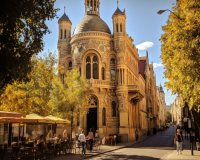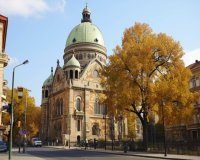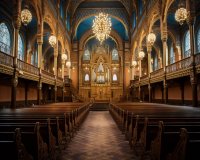How the Jewish Community Shaped Hungarian Culture

How the Jewish Community Shaped Hungarian Culture in Budapest
Budapest, the capital city of Hungary, is a vibrant and diverse metropolis that has been influenced by various cultures throughout its long history. Among the many communities that have left their mark on Budapest, the Jewish community holds a significant place. The history of the Jewish community in Budapest is intertwined with the city's cultural, social, and economic development, making it a fascinating subject to explore.
The Early Presence of Jews in Hungary
The history of Jews in Hungary dates back centuries, with records of Jewish communities in the region as early as the 11th century. These early Jewish settlers played essential roles in trade, finance, and various crafts, contributing to the economic growth of the area. Over time, the Jewish community in Hungary grew, and they established a strong presence in Budapest, which was then two separate cities, Buda and Pest.
19th Century: A Flourishing Jewish Community
The 19th century marked a significant period for the Jewish community in Budapest. During this time, Hungary underwent a series of political and social changes, including the Hungarian Revolution of 1848. Jews actively participated in these events, advocating for civil rights and equal treatment. The Jewish community began to flourish, making notable contributions to various fields, including literature, arts, and science.
One of the most renowned Jewish figures from this era was Theodor Herzl, who is considered the father of modern political Zionism. Herzl, born in Budapest, was deeply influenced by the city's multicultural environment and the struggles faced by the Jewish community. His ideas and writings laid the foundation for the establishment of the State of Israel.
The Jewish Quarter: A Cultural Hub
The Jewish Quarter in Budapest, located in the 7th district, became a vibrant center of Jewish life and culture. This area was home to numerous synagogues, schools, kosher restaurants, and cultural institutions. The Dohány Street Synagogue, also known as the Great Synagogue, is one of the most famous landmarks in the district and the largest synagogue in Europe.
During the late 19th and early 20th centuries, Budapest's Jewish community produced many influential artists, writers, and musicians. Jewish authors such as Frigyes Karinthy and Imre Kertész left lasting literary legacies, while musicians like Franz Liszt and Béla Bartók incorporated Jewish melodies into their compositions, reflecting the rich cultural exchange in the city.
World War II and the Holocaust
The 20th century brought significant challenges to the Jewish community in Budapest. During World War II, Hungary was under Nazi occupation, leading to the persecution and deportation of tens of thousands of Jews. The Arrow Cross regime, a fascist party in Hungary, collaborated with the Nazis, resulting in the tragic events of the Holocaust in Budapest.
Despite the dark times, the bravery of individuals like Raoul Wallenberg, a Swedish diplomat who saved thousands of Hungarian Jews, remains a beacon of hope. The Holocaust Memorial Center in Budapest stands as a solemn reminder of the city's painful history during this period.
Post-War Revival and Cultural Contributions
After World War II, the Jewish community in Budapest gradually rebuilt itself. Many survivors and their descendants played crucial roles in various aspects of Hungarian society. Budapest continued to be a hub of cultural exchange, with Jewish artists, scientists, and intellectuals contributing to the city's vibrancy.
Notable Jewish figures in post-war Budapest include Nobel laureate Albert Szent-Györgyi, who made significant contributions to physiology and biochemistry, and film director István Szabó, whose work garnered international acclaim.
Preserving Jewish Heritage
Today, Budapest proudly preserves its Jewish heritage through various museums, cultural events, and educational programs. Visitors can explore the Jewish Quarter, visit the Jewish Museum, and pay their respects at the Holocaust Memorial Center. These institutions help keep the memory of the Jewish community's contributions and the atrocities of the past alive.
Conclusion
The Jewish community has played an integral role in shaping the cultural fabric of Budapest throughout its history. From early economic contributions to the vibrant cultural and intellectual scene of the 19th and 20th centuries, the Jewish community's impact is undeniable. Despite the challenges faced during World War II, their resilience and determination have ensured that their legacy endures in the heart of the city.
Today, Budapest stands as a testament to the rich tapestry of cultures that have left their mark on the city, with the Jewish community's influence being a vital thread in this intricate story.
Budapest: Jewish Quarter Exploration Game
Discover the vibrant Jewish Quarter of Budapest through an exciting exploration game that combines clues, puzzles, and intriguing stories on your smartphone.
Join this adventure provided by Questo App, and embark on a journey to uncover hidden gems and rich history.
About this Activity
This immersive city game commences at the renowned Great Synagogue of Dohány Street and typically takes 1.5 to 2 hours to complete. You have the flexibility to explore at your own pace; pause the game and resume whenever you desire. Your captivating journey will conclude at the Carl Lutz Memorial.
As you solve challenges and puzzles, a captivating narrative unfolds, and your phone provides precise directions to lead you to the next location. Are you ready for this unique adventure?
Upon booking, you will receive an email containing instructions for downloading and playing the game on your smartphone. Whether you choose to play solo, with a large group, or in smaller competing teams, the game's final stop will bring everyone together.
Highlights
- Explore iconic sites such as Sisi Statue, Temple of Heroes, and Klauzál Park.
- Engage with a meticulously crafted story by top-notch writers.
- Visit the largest synagogue in Europe.
- Experience a blend of a tour, outdoor escape game, and treasure hunt.
- Read a page from the first sports newspaper in Hungary.
Includes
- A city exploration game accessible on your phone via the Questo app.
- 24/7 customer support.
- Tour guide (through the game).
- Entry tickets to attractions.
Meeting Point
The city game begins at the Great Synagogue of Dohány Street.
Important: Ensure your smartphone is fully charged.
Price
Starting from US$ 7.45 per person.
Reserve now to secure your spot without immediate payment.
Reviews
Discover what travelers have to say about this experience:
- "The story wasn't the best ever but took us to the best places in the Jewish quarter, we had fun!" - July 16, 2023, GGetYourGuide traveler from Germany.
- "The experience was enjoyable. We had fun exploring the Jewish quarter." - June 13, 2023, a traveler from Ireland.
- "A great way to discover the Jewish Quarter. We enjoyed it!" - May 15, 2023, a traveler from Germany.
Exploring Budapest's Heritage and Traditions
Budapest, the capital city of Hungary, is a place where the past and present seamlessly merge to create a unique cultural tapestry. Its rich heritage and deep-rooted traditions are a testament to the resilience of its people throughout history. In this article, we will delve into the heritage and traditions of Budapest, offering a glimpse into the heart of this captivating city.
Budapest's Architectural Heritage
One of the most striking aspects of Budapest's heritage is its architecture. The city boasts a diverse range of architectural styles, with influences from Roman, Gothic, Renaissance, and Baroque periods. Perhaps the most iconic symbol of Budapest is the Buda Castle, a majestic hilltop fortress that has witnessed centuries of history. Strolling through the historic district of Buda, visitors can admire the charming cobblestone streets and centuries-old buildings that harken back to a bygone era.
Budapest's thermal baths also have a storied past, dating back to Roman times. These thermal baths, such as the Széchenyi Thermal Bath and Gellért Baths, have become an integral part of Budapest's culture and tradition. Locals and tourists alike indulge in the healing properties of these thermal waters, relaxing in the opulent surroundings that pay homage to Budapest's historical grandeur.
Culinary Traditions
Budapest's culinary heritage is a fusion of flavors influenced by various cultures that have left their mark on the city. Traditional Hungarian dishes like goulash, paprikash, and chimney cake (kürtőskalács) are staples of Budapest's gastronomic landscape. These dishes reflect the country's agricultural heritage and its use of paprika, a spice that Hungary is renowned for.
Moreover, Budapest is famous for its coffeehouse culture, which dates back to the late 19th century. The city's grand cafés, such as New York Café and Gerbeaud, have been frequented by intellectuals, artists, and writers for generations. These cafés are not just places to enjoy coffee and pastries; they are institutions where conversations and ideas have flowed freely for decades.
Festivals and Celebrations
Budapest is a city that knows how to celebrate its heritage and traditions. Throughout the year, various festivals and events pay homage to the city's culture. One such event is the Budapest Wine Festival, where visitors can taste some of Hungary's finest wines while enjoying live music and cultural performances.
The Budapest International Documentary Festival and Budapest Opera Ball are other examples of how the city celebrates its artistic heritage. These events showcase the talent and creativity that have thrived in Budapest for centuries.
Bridging the Past and Present
While Budapest cherishes its heritage and traditions, it is also a dynamic and forward-thinking city. Its blend of old and new is evident in the juxtaposition of historic landmarks and modern architecture along the Danube River. The Chain Bridge, which connects Buda and Pest, is a symbol of this harmonious coexistence of the past and present.
As you wander through the streets of Budapest, you'll find that the city's heritage and traditions are not relics of the past but living, breathing elements of its identity. Whether you're savoring a bowl of traditional goulash, taking a dip in a thermal bath, or marveling at the grandeur of its architecture, Budapest's rich cultural heritage is sure to leave a lasting impression.
Conclusion
Budapest's heritage and traditions are an integral part of what makes this city so enchanting. Its architectural treasures, culinary delights, festivals, and the seamless blending of the past and present create a vibrant tapestry of culture and history. Exploring Budapest is like embarking on a journey through time, where every corner reveals a piece of its fascinating heritage.
Jewish Heritage Exploration in Budapest
Embark on a 3-hour small group tour with a knowledgeable historian guide to unravel the rich tapestry of Jewish heritage in Budapest. Delve into the captivating history of the Jewish district, tracing its roots back to the late 1700s.
Discover the intricacies of the Rumbach Street Synagogue, a gem in the heart of the city. As you navigate the 7th district, witness over two centuries of Jewish culture flourishing, hosting today the largest and most vibrant Jewish community in Eastern Europe.
Explore the renowned Dohány Street Synagogue, Europe's largest and one of the world's grandest synagogues. Wander through the Jewish Quarter, once the Ghetto, adorned with synagogues, monuments, kosher establishments, and captivating street art.
Hear local narratives and Budapest tales as you stroll, including the inspiring story of Carl Lutz, honored as one of the Righteous Among the Nations, Hungary's Schindler. Pass by the lively Gozsdu Passage and delve into the history of the Rumbach Street Synagogue, an architectural marvel crafted in 1872 by Viennese architect Otto Wagner.
Beyond the grandeur of Europe's largest synagogue, glean insights into Budapest's ruin pubs, nightlife, street art, and the secrets of Elizabeth Town. Your journey is a fusion of history, culture, and local anecdotes.
Highlights:
- Immerse in Hungary's turbulent Jewish history spanning centuries.
- Visit the iconic Rumbach Street Synagogue and the colossal Dohány Street Synagogue.
- Explore the Jewish Quarter, once the Ghetto, brimming with synagogues and cultural gems.
- Discover the tales of heroes like Carl Lutz and unravel the secrets of Elizabeth Town.
Your guide, a passionate historian, ensures a deep dive into Budapest's Jewish legacy, making this a tour of enlightenment and discovery.
Meeting Point: Meet your guide in front of Kempinski Hotel Corvinus Budapest, facing the Ferris wheel on Erzsébet Square. Easily accessible via M1, M2, or M3 subways and various buses and trams.
Price: Starting from US$ 47.97 per person
Reviews: Rated 4.9/5 based on 97 reviews. Visitors praise the engaging guides and the immersive journey through Budapest's Jewish history.
Significant Places and Personalities in Budapest
Budapest, the capital of Hungary, is a city steeped in history and culture. It is a place where significant places and personalities have left their mark, shaping the identity of this magnificent city. In this article, we will explore some of the most notable locations and individuals that have played a vital role in Budapest's rich history.
Historical Landmarks
One of the most iconic landmarks in Budapest is the Buda Castle. Perched on the Buda Hill overlooking the Danube River, this majestic castle complex has witnessed centuries of history. Originally built in the 13th century, it has been the residence of Hungarian kings and is now home to the Hungarian National Gallery and the Budapest History Museum.
The Chain Bridge is another iconic structure that spans the Danube River, connecting the Buda and Pest sides of the city. Designed by the English engineer William Tierney Clark and opened in 1849, it was the first permanent bridge linking the two parts of the city and remains a symbol of Budapest's unity.
For those interested in architecture, the Parliament Building is a must-visit. This magnificent neo-Gothic building on the Pest side of the river is the largest parliament building in Europe. Its grandeur and intricate details make it one of the most photographed landmarks in Budapest.
Famous Personalities
Budapest has been home to many influential and renowned personalities throughout history. One of the most notable figures is Franz Liszt, the famous Hungarian composer and pianist. Liszt's music continues to enchant audiences worldwide, and his former residence in Budapest is now the Liszt Ferenc Memorial Museum.
Imre Kertész, a Hungarian writer and Holocaust survivor, was awarded the Nobel Prize in Literature in 2002. His literary works, including "Fatelessness," shed light on the horrors of the Holocaust and have left an indelible mark on world literature.
The world of sports also has its share of Budapest's famous personalities. Ferenc Puskás, often regarded as one of the greatest footballers of all time, was born in Budapest. He was known for his incredible skill and prolific goal-scoring ability, and his legacy lives on in the sport.
Cultural Heritage
Budapest is not only known for its landmarks and personalities but also for its vibrant cultural scene. The Hungarian State Opera House is a prime example of the city's cultural heritage. With its opulent interior and world-class performances, it is a testament to Budapest's commitment to the arts.
The Ruin Bars of Budapest have also gained international fame. These unique bars are set in abandoned buildings and courtyards, creating an eclectic and artistic atmosphere. They have become hubs of creativity and nightlife in the city.
Conclusion
In conclusion, Budapest is a city that boasts a rich tapestry of significant places and personalities. From its historic landmarks to its celebrated individuals, and its thriving cultural scene, Budapest continues to captivate visitors from around the world. Exploring these facets of Budapest is not only a journey through time but also an immersion in the heart and soul of Hungary's capital.







